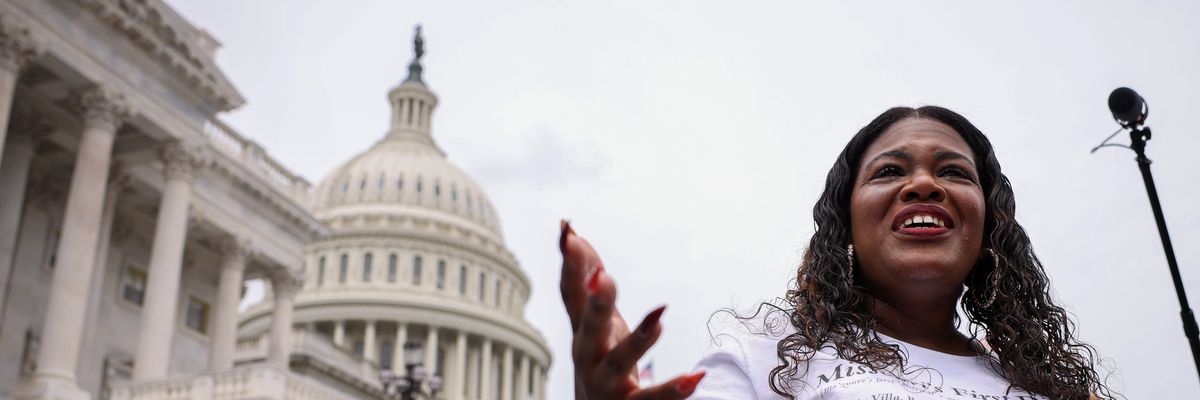Housing justice advocates on Monday praised U.S. Rep. Cori Bush for reintroducing the
Unhoused Bill of Rights, a resolution that outlines how the federal government can permanently end the nation's homelessness crisis by 2027.
"Being able to afford a safe place to live is a human right that has been undermined by intentional policy decisions," Bush (D-Mo.) said in a
statement. "That is why, as co-chair of the Congressional Caucus on Homelessness, I am proud to reintroduce the Unhoused Bill of Rights, legislation that commits the federal government to addressing the root of our nation's housing crisis."
"My children and I have personally experienced the trauma, stress, stigma, and pain that comes with being unhoused," said Bush. "Our veterans, LGBTQ+ individuals, people with disabilities, and our youth are disproportionately at risk of becoming unhoused."
"We have the power and money to end the unhoused crisis," she added. "We just need the will to reorient congressional priorities."
As many as 1.5 million people in the U.S. are "struggling to survive on the streets,"
said Bush's office, which called this entirely avoidable injustice "urgent" and "life-threatening." Among other things, the resolution urges the U.S. Department of Health and Human Services (HHS) to declare homelessness a public health emergency.
"The inability of the richest country in the world to guarantee housing, universal medical care, and livable wages to its people represents a moral and political failure at every level of our society," Bush's office continued. "Lawmakers at every level of government, especially the federal government, must take swift action to end the unhoused crisis and immediately provide desperately needed resources to unhoused persons, communities, advocates, and service providers."
Bush unveiled an earlier version of the Unhoused Bill of Rights (UBR) just weeks before the August 2021 expiration of the federal eviction moratorium that was implemented at the start of the coronavirus pandemic. The proposals in that unprecedented resolution went unheeded, and the newly introduced UBR documents the devastating consequences of inaction.
Bush's office described the reintroduction of the UBR as a response to "the bleak post-Covid economic reality faced by millions of low-income renters, where rising housing costs continue to rapidly outpace wages and force people to live on the streets."
Congress has refused to
raise the federal minimum wage of $7.25 per hour since 2009. Meanwhile, the national median rent increased by 42% between 2009 and 2021, from $817 per month to $1,163 per month, according to Bush's resolution. To afford a one-bedroom apartment without spending more than 30% of their income on rent, a full-time worker in the U.S. must make $23.67 per hour—equivalent to more than three minimum-wage jobs.
"The unhoused crisis continues to ravage communities, claim lives, render people permanently disabled, funnel people through the criminal-legal system, and create barriers to employment, education, civic participation, and overall happiness," the lawmaker's office lamented. "Maintaining poverty and homelessness is a policy choice. We must stand together as lawmakers, advocates, and impacted people to make the right choice to end the unhoused crisis once and for all."
The UBR analyzes how unhoused people are criminalized, dehumanized, and mistreated by law enforcement officials, business owners, and affluent consumers. In coordination with HHS, the U.S. Department of Housing and Urban Development (HUD), the U.S. Centers for Disease Control and Prevention (CDC), community-led organizations, and unhoused advocates, Bush developed "holistic, health-based, and noncarceral solutions" to homelessness.
Specifically, the resolution calls on the federal government to:
- Permanently end the unhoused crisis by 2027 by drastically increasing the affordable housing stock, providing universal housing vouchers, and bolstering funding to federal housing programs, shelters, transitional and permanent housing programs, social services, and permanent emergency rental assistance;
- Protect unhoused individuals from the violation of their fundamental human rights to housing, healthcare, livable wages, education, employment opportunities, access to public facilities, and freedom from harassment by law enforcement, private businesses, property owners, and housed residents; and
- Support historic federal funding levels for state and local governments to provide 24-hour support for unhoused people, including: shelters, transitional housing programs, supportive services, public restrooms, hand-washing stations, showers, laundry facilities, and water fountains in coordination with grassroots and community-led organizations.
The resolution is cosponsored by the following 16 House Democrats: Rashida Tlaib (Mich.), Eleanor Holmes Norton (D.C.), Barbara Lee (Calif.), Pramila Jayapal (Wash.), Jamaal Bowman (N.Y.), Bonnie Watson Coleman (N.J.), Yvette Clarke (N.Y.), André Carson (Ind.), Danny Davis (Ill.), Earl Blumenauer (Ore.), Greg Casar (Texas), Nydia Velázquez (N.Y.), Jim McGovern (Mass.), Nikema Williams (Ga.), Ayanna Pressley (Mass.), and Alexandria Ocasio-Cortez (N.Y.).
It is also endorsed by dozens of progressive advocacy groups, including the National Low-Income Housing Coalition (NLIHC), the National Alliance to End Homelessness, and the National Coalition for the Homeless.
The leaders of those and other organizations commended Bush for reintroducing the UBR.
"Housing is a human right and bold solutions—including universal rental assistance, preservation and expansion of public housing, investments in the national Housing Trust Fund, robust and enforced tenant protections—are necessary to end homelessness," said NLIHC president Diane Yentel.
"Homelessness is one of our country's most urgent, tragic, and solvable crises, and Congress must use every opportunity to advance the policy solutions needed to end it," Yentel added. "I applaud Congresswoman Bush for helping to build the political will necessary to end this entirely preventable crisis."
According to Paula Lomazzi, executive director of the Sacramento Homeless Organizing Committee, "The Unhoused Bill of Rights is direly needed to start solving homelessness."
"The answer is not sweeping unhoused people from visibility," said Lomazzi, "but to provide adequate, affordable, and supportive housing."

